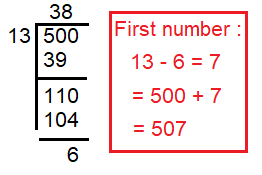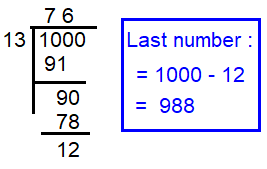PRACTICE ON ARITHMETIC SEQUENCE AND SERIES
Subscribe to our ▶️ YouTube channel 🔴 for the latest videos, updates, and tips.
Problem 1 :
Which term of the AP
3/√7, 4/√7, 5/√7, ............ is 17/√7 ?
Solution :
3/√7, 4/√7, 5/√7, ............ is 17/√7
Let general term be 17/√7.
tn = 17/√7, a = 3/√7 and d = 4/√7 - 3/√7 ==> 1/√7
a + (n - 1)d = 17/√7
3/√7 + (n - 1)(1/√7) = 17/√7
(n - 1)(1/√7) = 17/√7 - 3/√7
(n - 1)(1/√7) = 17/√7 - 3/√7
(n - 1)(1/√7) = 14/√7
n - 1 = (14/√7) √7
n - 1 = 14
n = 15
So, 15th term of the arithmetic series is 17/√7.
Problem 2 :
Divide 69 into three parts which are in A.P and are such that the product of the first two parts is 483.
Solution :
Let the first three terms be a - d, a and a + d.
Sum of three terms = 69
a - d + a + a + d = 69
3a = 69
a = 23
Product of three terms = 483
a (a - d) = 483
23(23 - d) = 483
(23 - d) = 483/23
23 - d = 21
d = 23 - 21
d = 2
a - d ==> 23 - 2 ==> 21
a = 23
a + d ==> 23 + 2 ==> 25
So, the required terms are 21, 23 and 25.
Problem 3 :
Insert 4 arithmetic means between 4 and 324.
Solution :
let b, c, d and e are those 4 required terms.
4, b, c, d, e, 324.
First term (a) = 4
6th term = 324
t6 = 324
a + 5d = 324 ----(1)
By applying the value of a in (1), we get
4 + 5d = 324
5d = 324 - 4
5d = 320
d = 320/5
d = 64
|
2nd term : = a+d = 4+64 = 68 |
3rd term : = a+2d = 4+128 = 132 |
4th term : = a+3d = 4+192 = 196 |
5th term : = a+4d = 4+256 = 260 |
Problem 4 :
If the pth term of an A.P is q and qth term is p the value of the rth term is
(a) p - q - r (b) p + q - r (c) p + q + r (d) None
Solution :
tp = a + (p - 1)d = q ----(1)
tq = a + (q - 1)d = p----(2)
(1) - (2)
[a + (p - 1)d] - [a + (q - 1)d] = q - p
d(p - 1 - q + 1) = q - p
d(p - q) = q - p
d = -1
By applying the value of d in (1), we get
a + (p-1) (-1) = q
a = q + p - 1
rth term :
tr = a + (r - 1) d
tr = q + p - 1 + (r - 1) (-1)
tr = q + p - 1 - r + 1
tr = q + p - r
Problem 5 :
The sum of a series in A.P is 72 the first term is 17 and the common difference -2, the number of terms is
(a) 6 (b) 12 (c) 6 or 12 (d) None
Solution :
sn = 72, a = 17 and d = -2
sn = (n/2)[2a+ (n - 1) d]
72 = (n/2)[2(17)+ (n - 1) (-2)]
72 = (n/2)[34 - 2n + 2]
72 = (n/2)[36 - 2n]
72 = n[18 - n]
18n - n2 = 72
n2 - 18n + 72 = 0
(n - 12)(n - 6) = 0
n = 6 and n = 12
Problem 6 :
The sum of all natural numbers between 500 and 1000, which are divisible by 13 is
(a) 28400 (b) 28405 (c) 28410 (d) None
Solution :
To find the first number which is divisible by 13 and more than 500 is 507.

To find the last number which is divisible by 13 and lesser than 1000 is 988.

507 + 520 + 533 + .................+ 988
Number of terms between 507 to 988 are
n = [(l-a)/d] + 1
n = [(988 - 507) / 13] + 1
n = 38
Sum of 38 terms :
s38 = (38/2)[507 + 988]
s38 = 19[1495]
s38 = 28405
So, the sum of numbers between 500 to 1000 which are divisible by 13 is 28405.
Problem 7 :
If the 10th term of an A.P. is twice the 4th term, and the 23rd term is 'k' times the 8th term, then the value of 'k' is
(a) 2.5 (b) 3 (c) 3.5 (d) 4
Solution :
10th term = 2(4th term) ----(1)
23rd term = k(8th term) ----(2)
From (1)
a + 9d = 2(a + 3d)
2a - a + 6d - 9d = 0
a - 3d = 0
a = 3d
From (2)
a + 22d = k(a + 7d)
Applying the value of a, we get
3d + 22d = k(3d + 7d)
25d = k(10d)
25/10 = k
k = 2.5
Problem 8 :
The sum of the A.M. and G.M. of two positive numbers is equal to the difference between the numbers. The numbers are in the ratio.
(a) 1 : 3 (b) 1 : 6 (c) 9 : 1 (d) 1 : 12
Solution :
Let a, c and b be three terms.
Arithmetic mean = (a + b)/2
Geometric mean = √ab
(a + b)/2 + √ab = a - b
√ab = (a - b) - [(a + b)/2]
√ab = (2a - 2b - a - b)/2
√ab = (a - 3b)/2
Taking squares on both sides.
4ab = a2 - 6ab + b2
a2 - 4ab - 6ab + 9b2 = 0
a2 - 10ab + 9b2 = 0
a2 - ab - 9ab + 9b2 = 0
a(a - b) -9b(a - b) = 0
(a - b) (a - 9b) = 0
a = 9b
a/b = 9 : 1
So, the answer is 9 : 1.
Subscribe to our ▶️ YouTube channel 🔴 for the latest videos, updates, and tips.
Recent Articles
-
Finding Range of Values Inequality Problems
May 21, 24 08:51 PM
Finding Range of Values Inequality Problems -
Solving Two Step Inequality Word Problems
May 21, 24 08:51 AM
Solving Two Step Inequality Word Problems -
Exponential Function Context and Data Modeling
May 20, 24 10:45 PM
Exponential Function Context and Data Modeling